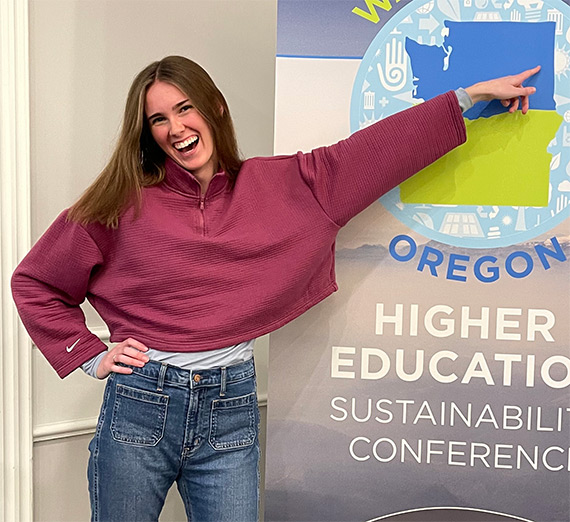Meet Claire Booth

What is your position/department/year/major/club affiliation at Gonzaga?
I am the Sustainability and Resilience Programs Coordinator for the Office of Sustainability. My position is through an Americorps service term.
What does sustainability mean to you?
Sustainability to me means intentionally thinking about how we get our resources (such as food, water, and energy) and working to ensure they will be available for the longest amount of time possible.
How have you been involved in promoting sustainability on campus?
Through my position, I lead GU’s Student Sustainability Leadership Program and the Employee Sustainability Ambassadorship. Both programs engage our GU community with sustainability topics, local guest speakers, and critical dialogue around how we can all lead sustainable lives!
What are some things you do in your personal life to live sustainably?
I try to do small things, like unplugging appliances I’m not using to save energy, or being intentional with my water use. Since starting this position, I’ve been making tiny zero-waste switches like using reusable sandwich bags, buying bulk items, and making my own granola bars!
How could Gonzaga continue to improve its sustainability efforts?
Properly using waste bins (compost, trash, and recycling) goes a long way, more so than people may think. Being aware of the products/items you purchase, too, can help you see areas where less wasteful options can be used!
How will you continue to promote sustainability at Gonzaga?
Throughout the remainder of my position, I plan on continuing to build relationships with GU students, staff, and faculty in the leadership programs I facilitate to spur ideas and collaboration around what we can do to make our lives more sustainably conscious.
How do you see sustainability intersecting with social justice issues on an institutional, country, or global scale?
Sustainability and social justice are intrinsically intertwined; we cannot have one without the other. Both involve an intentional analysis of how we treat people and our planet, with the goal of creating systems that support equitable growth. Consequently, this involves spotlighting the places where exploitation, neglect, and misuse are present when we think about resource allocation, like access to nutritious food and clean water. Sustainability and social justice work together to create resilience, now and for future generations.
